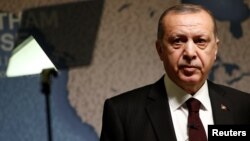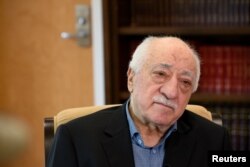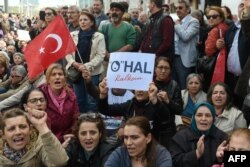A state of emergency imposed in Turkey following a failed coup two years ago this week is set to end in the coming days. But there are concerns that the government will maintain draconian measures under a different guise.
Justice Minister Abdulhamit Gul Monday confirmed the imminent end to emergency rule, a move broadly welcomed.
“The end of the emergency rule, which bypasses parliament on key issues, has been something demanded internationally and domestically for better conditions and for the independence of the judiciary and the media,” Murat Yetkin, editor of Hurriyet Daily News, wrote Tuesday.
Human rights groups say that under the emergency powers, more than 150 journalists were jailed, and newspaper outlets, television and radio stations seized. Tens of thousands of prosecutors and judges, along with academics, were detained or removed from their posts.
The government maintains the measures were needed to remove the threat posed by followers of Turkish cleric Fethullah Gulen, who Turkish President Recep Tayyip Erdogan blames for the botched military takeover. Gulen, who lives in self-imposed exile in the U.S., denies the accusation.
Despite the government’s decision to lift the state of emergency, critics say the status quo will remain in place. They point to parliament’s consideration of sweeping new anti-terrorism legislation that would allow authorities to detain people for up to 12 days without charge in anti-terror cases. Erdogan’s ruling party, the AKP, is pushing for passage of the measures that would also give governors the power to stop people from leaving or entering defined areas.
Additionally, state workers, including security forces, would be removed from their posts for three years if considered a threat. The interior minister would also be empowered to cancel passports of those dismissed from their jobs. The passport policy would also apply to their spouses.
“Lifting the state of emergency appears good but doesn’t change anything,” political columnist Semih Idiz of Al-Monitor website said. “The authorities have the same powers as they do under emergency rule. Especially with the newly expanded powers being pushed through parliament, it will be the state of emergency by default,” he added.
The main opposition Republican People's Party, the CHP, criticized the new legislation. “It aims to make the state of emergency rule permanent,” deputy group leader Ozgur Ozel wrote in a statement.
Despite the proposed new powers, analyst Atilla Yesilada of Global Source Partners suggests there remains a way for Erdogan to make a conciliatory gesture.
“One way to keep the binding provisions of state of emergency in the new legislation but signal a more tolerant approach to human rights such as free speech is to release most of the 150 journalists and intellectuals currently locked up, as well as ending the practice of firing academics for pro-PKK (Kurdish insurgents) or Gulenist sympathies,” Yesilada said. Turkey considers the PKK a terrorist organization. The PKK has been waging a decades-long insurgency in southeastern Turkey.
On Monday, prominent journalist Erdem Gul was acquitted of charges of publishing state secrets. Last month, Mehmet Altan, a well-known writer, academic and Erdogan critic, was released from jail. Altan had been serving a life sentence on charges of helping the plotters behind the attempted coup. Both writers are widely seen as high-profile cases on freedom of expression.
Human rights groups point out the arrests and detentions of government critics continue.
Another court case in the spotlight is that of jailed U.S pastor Andrew Brunson, whose trial is due to resume in the western Turkish city of Izmir Wednesday. Brunson has been incarcerated for nearly two years under emergency rule on charges of supporting both the PKK and Fethullah Gulen.
U.S. President Donald Trump and Congress have described the Brunson case as baseless.
“It’s (case) very important because it’s already an obstacle and sticking point between the two countries, having prompted the discussion about sanctions against Turkey,” Idiz said.
“Erdogan needed to maintain his image during the elections that he didn’t want to cave into international pressure. We have a very different situation now. He is in an insecure position now with his re-election. And the court will possibly take note of the situation,” said Idiz. Erdogan was re-elected last month in the vote that allows him to consolidate power.
Trump has until now headed off threats from Congress to sanction Turkey. Failure to release Brunson at Wednesday’s hearing could result in a rapid escalation in bilateral tensions.
“Even Trump’s good graces may not be able to deter Congress from punishing Turkey. In that scenario, the relationship enters the proverbial “slippery slope,” Yesilada said.








